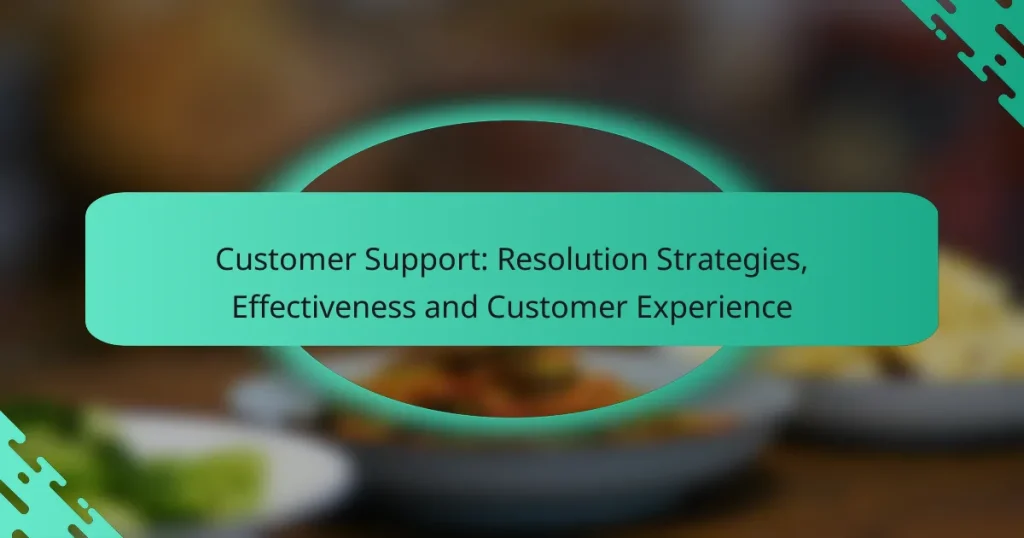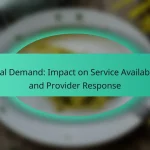In today’s competitive landscape, effective customer support resolution strategies are essential for enhancing the overall customer experience. By focusing on proactive communication, personalized assistance, and leveraging technology, businesses can resolve issues swiftly while fostering customer loyalty. The effectiveness of these strategies is measured through key metrics, which provide valuable insights into customer satisfaction and brand perception.

What are effective customer support resolution strategies in Los Angeles?
Effective customer support resolution strategies in Los Angeles focus on enhancing customer experience through proactive communication, personalized support, and the use of technology. These strategies aim to resolve issues quickly while ensuring customer satisfaction and loyalty.
Proactive communication
Proactive communication involves reaching out to customers before they encounter issues. This can include sending notifications about service updates or checking in after a purchase. By anticipating customer needs, businesses can reduce frustration and improve overall satisfaction.
In Los Angeles, where competition is fierce, maintaining open lines of communication can set a business apart. Regular updates via email or SMS can keep customers informed and engaged, leading to a more positive experience.
Personalized support
Personalized support tailors the customer experience to individual needs, making customers feel valued. This can be achieved through understanding customer history and preferences, allowing representatives to provide relevant solutions quickly.
In a diverse city like Los Angeles, recognizing cultural nuances and language preferences can enhance customer interactions. Training staff to offer personalized service can lead to higher satisfaction and loyalty.
Utilizing AI chatbots
AI chatbots can provide immediate assistance to customers, handling common inquiries and freeing up human agents for more complex issues. These bots can operate 24/7, ensuring that customers receive timely responses regardless of the hour.
In Los Angeles, where customers may have varying schedules, the availability of AI chatbots can significantly improve response times and overall service efficiency. However, it’s crucial to ensure that chatbots are programmed to escalate issues to human agents when necessary.
Feedback loops
Implementing feedback loops allows businesses to gather insights from customers about their experiences. This can involve surveys or follow-up calls after support interactions, helping identify areas for improvement.
In Los Angeles, actively seeking feedback can help businesses adapt to changing customer expectations and preferences. Regularly reviewing feedback can lead to actionable changes that enhance the support process.
Knowledge base resources
A comprehensive knowledge base provides customers with self-service options to resolve issues independently. This can include FAQs, troubleshooting guides, and instructional videos, making it easier for customers to find solutions quickly.
In Los Angeles, where many customers prefer quick resolutions, a well-organized knowledge base can reduce the volume of support requests. Ensuring that this resource is easily accessible and regularly updated is essential for maintaining its effectiveness.

How does customer support effectiveness impact customer experience?
Customer support effectiveness directly influences customer experience by ensuring issues are resolved promptly and satisfactorily. When customers receive efficient support, their overall satisfaction increases, leading to a more positive perception of the brand.
Increased customer satisfaction
Effective customer support leads to higher levels of customer satisfaction as it addresses concerns quickly and accurately. When customers feel heard and valued, they are more likely to express contentment with the service they receive. This can be achieved through timely responses, knowledgeable representatives, and personalized interactions.
For example, companies that implement live chat options often see satisfaction scores rise, as customers appreciate immediate assistance. Regular feedback collection can also help identify areas for improvement, ensuring that customer needs are consistently met.
Higher retention rates
When customer support is effective, it significantly boosts retention rates. Satisfied customers are less likely to switch to competitors, as they develop a sense of trust and reliability with the brand. A seamless support experience can reduce churn, particularly in competitive markets.
Businesses should focus on creating a robust support system that includes follow-ups and proactive outreach. For instance, sending a follow-up email after a support interaction can reinforce the customer’s positive experience and encourage them to remain loyal.
Brand loyalty enhancement
Effective customer support enhances brand loyalty by fostering emotional connections with customers. When customers feel that their issues are resolved with care and attention, they are more likely to become repeat buyers and advocates for the brand. This loyalty can translate into long-term revenue growth.
To cultivate brand loyalty, companies should train support staff to go above and beyond in their interactions. Offering loyalty programs or exclusive benefits for returning customers can also strengthen the bond between the customer and the brand, encouraging ongoing engagement.

What are the key metrics for measuring customer support effectiveness?
Key metrics for measuring customer support effectiveness include first response time, resolution time, customer satisfaction score, and net promoter score. These metrics provide insights into how well a support team meets customer needs and expectations.
First response time
First response time measures how quickly a customer receives an initial reply after submitting a support request. This metric is crucial as it sets the tone for the customer experience and can significantly impact satisfaction levels.
Aim for a first response time of under 30 minutes for live chat and within a few hours for email support. Quick responses can enhance customer perceptions of your service quality.
Resolution time
Resolution time tracks the duration it takes to fully resolve a customer issue from the moment it is reported. This metric reflects the efficiency of your support team and the complexity of the issues they handle.
Strive for resolution times that fall within a few hours to a couple of days, depending on the issue’s nature. Complex problems may require longer, but aim to keep customers informed throughout the process to maintain trust.
Customer satisfaction score
The customer satisfaction score (CSAT) gauges how satisfied customers are with the service they received. Typically measured through post-interaction surveys, this metric is vital for understanding customer perceptions.
CSAT scores are often expressed as a percentage, with a target of 80% or higher being desirable. Regularly analyze feedback to identify areas for improvement and enhance overall service quality.
Net promoter score
Net promoter score (NPS) assesses customer loyalty by asking how likely customers are to recommend your service to others. This metric provides insight into long-term customer relationships and brand perception.
NPS is calculated on a scale from -100 to 100, with scores above 0 indicating more promoters than detractors. Aim for a score in the positive range, and use the feedback to foster loyalty and improve service offerings.

What role does training play in customer support effectiveness?
Training is crucial for enhancing customer support effectiveness as it equips representatives with the necessary skills and knowledge to resolve issues efficiently. Well-trained staff can improve customer satisfaction, reduce resolution times, and foster loyalty.
Skill development
Skill development in customer support involves training representatives in specific techniques and tools that enhance their ability to assist customers. This can include learning how to use customer relationship management (CRM) software, understanding ticketing systems, and mastering troubleshooting procedures.
Regular workshops and simulations can help reinforce these skills. For example, role-playing scenarios can prepare staff for real-life interactions, allowing them to practice responses to various customer inquiries and complaints.
Product knowledge
Product knowledge is essential for customer support representatives to provide accurate and helpful information. Understanding the features, benefits, and common issues related to products allows representatives to address customer questions effectively and confidently.
Training sessions should include comprehensive overviews of products and services, supplemented by updates on new releases or changes. This ensures that representatives can offer timely and relevant assistance, ultimately improving the customer experience.
Soft skills enhancement
Soft skills enhancement focuses on developing interpersonal skills that are vital for effective customer interactions. Skills such as empathy, active listening, and clear communication can significantly impact how customers perceive support services.
Training programs should incorporate techniques for improving these skills, such as practicing active listening exercises or learning conflict resolution strategies. By fostering strong soft skills, representatives can build rapport with customers and create a more positive support experience.

How can local businesses improve their customer support processes?
Local businesses can enhance their customer support processes by actively seeking feedback and engaging with their community. Implementing effective strategies tailored to local needs can lead to improved customer satisfaction and loyalty.
Implementing local feedback surveys
Local feedback surveys allow businesses to gather insights directly from their customers about their support experiences. These surveys can be distributed through email, social media, or in-store, and should focus on specific aspects of the service, such as response time and issue resolution.
To maximize effectiveness, keep surveys short and targeted, ideally taking no more than a few minutes to complete. Offering incentives, like discounts or loyalty points, can also encourage higher response rates and more honest feedback.
Leveraging community engagement
Engaging with the local community fosters trust and strengthens relationships with customers. Businesses can participate in local events, sponsor community initiatives, or collaborate with other local organizations to enhance their visibility and reputation.
Consider hosting workshops or informational sessions that address common customer concerns. This not only positions the business as a helpful resource but also provides opportunities for direct interaction, allowing for immediate feedback and support.


